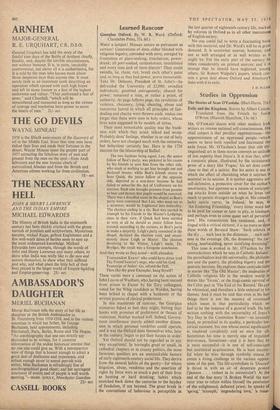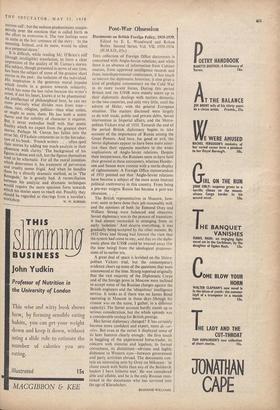Studies in Oppression
The Stories of Sean O'Fnolain. (Hart-Davis, 21s.) Exile and the Kingdom. Stories by Albert Camus. Translated from the French by Justin O'Brien. (Hamish Hamilton, 13s. 6d.) MR. O'FAOLAIN shares with other modern Irish writers an intense national self-consciousness. His chief subject is that peculiar oppressiveness—the oppressiveness of an oppressed people—which seems to have both repelled and fascinated the exile Joyce. Mr. O'Faolain's lesser (but still dis- tinguished) art in these stories conveys an attitude of less asperity than Joyce's. It is true that, after a romantic phase, illustrated by the incantatory prose of a story like 'Fugue,' his art does come close to that of a satirist. But his satire is one in which the effect of cherishing what it satirises is essential to its success. It is neither aggressive nor self-defensive, a protective cover for the author's uncertainty, but operates as a means of anticipat- ing attacks from outside on what he loves too much to permit strangers to laugh at. His comedy lacks satiric verve; 'in Ireland,' he says, in `An Enduring Friendship,' every bitter word has to be paid for sooner or later in pity, in kindness, and perhaps even in some queer sort of perverted love.' His romanticism has remained, and, if tinged with a critical element, it is no more so than these words of Bernard Shaw : 'Such colours in the sky ... such lure in the distances ... such sad- ness in the evenings. Oh, the dreaming! the tor- turing, heartscalding, never satisfying dreaming!'
This tone• is evoked in Mr. O'Faolain by the contradictions which he sees in Catholic Ireland: the parochialism and the universality, the philislin- ism and the poetry, the plodding bigotry and the quixotic heroism. He explores these contradictions in stories like 'The Old Master'; the anti:miles of Catholic religious life in the modern world, in stories like 'Teresa'; or the tragi-comic survival of the Celtic past in 'The Erid of the Record.' He, can be whimsical, and therefore a little external to his themes. And it must be said that even in his best things there is not the mastery of command which issues in that particularity which we feel to be the instance of a general truth. He has written nothing with the universality of Joyce's `Ivy Day in the Committee Roorn'—so intensely local, so parochial in its quality, a particular his- torical moment, but one whose moral significance is rendered completely and so once for all. Sometimes his tone is merely one of impatient irreverence. Sometimes—and it is here that he is most successful—it is one of self-conscious but unironical acquiescence. He is least success- ful when• he tries through symbolic means to create a living challenge to the various oppres- sions of the past. The life-symbolism in 'Discord' is thrust in with an air of desperate protest (`passion . . . violent in its unrestraint'). At the end of the fine story 'A Broken World' the nar- rator tries to refute within himself the pessimism of the enlightened, defeated priest; he speaks of `spring,' triumph,"engendering love,' a resur-
rection call'; but the sadness predominates imagin- atively over the emotion that is called forth in the effort to overcome it. The two feelings seem to unite in the last sentence of the story : 'In the morning, Ireland, and its snow, would be silent as a perpetual dawn.'
It is difficult, while reading Mr. O'Brien'g stiff (though intelligible) translation, to form a clear impression of the quality of M. Camus's stories. His subject, though presented in terms of our time, has been the subject of some of the greatest short stories in the past : the isolation of the individual. His inspiration is the generous moral impulse which results in a gesture towards solidarity, which has none the less value because the writer's mind, if not his heart, knows it to be phantasmal. An mtellectual of philosophical bent, he can say more precisely what divides man from man— class, race, religion, politics—than what unites, or ought to unite, them. He has both a noble theme and the nobility of character it requires. But it never embodies itself with that poetic finality which we expect from the greatest short stories. Perhaps M. Camus has fallen into the error Mr. O'Faolain comments on in the Introduc- tion of his book : 'French writers . . . often spoil their stories by adding too much analysis in their obsession with clarity.' The background of his figures is dense and rich, but the figures themselves tend to be schematic. For all the moral intention which determines it, his treatment of perversion and cruelty seems frigid. And when he handles them by a directly dramatic method, as in 'The Renegade,' he is grossly bad. A reconciliation between his analytic and dramatic techniques would require the more spacious form towards Which his stories seem to reach out. Possibly they should be regarded as shavings from a novelist's



































 Previous page
Previous page